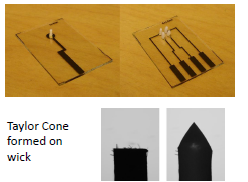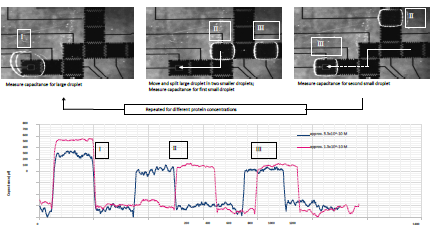Ion Mobility Spectrometry
In Ion Mobility Spectrometry, charged species (ions) are injected into an enclosed drift chamber with an electric field applied along its axis. Under the influence of this field, ions are transported through the chamber toward a detector. The ion’s mobility along the drift chamber is a function of the ion’s electric charge, mass, and size. Therefore, different ions are transported at different velocities, with each ion type having its own signature mobility.
The identity of ions can be determined by measuring this signature mobility and comparing results to an established database. Mobility is expressed as a function of:
- Electric field and drift length (known parameters)
- Drift time (measured parameter), which is the duration between ion injection and detection
This work examines a gating strategy and counter electrode configuration for a ‘planar-type’ device that can be used to further the development of miniaturized Ion Mobility Spectrometers.

Immunosensor Development
The goal is to develop an immunosensor designed to function with common particle-based fluorescence immunoassays. The chemifluorescent reaction product creates a change in fluid composition, resulting in altered electrical and dielectric properties of the fluid.
When implemented on a digital microfluidic (DMF) device, the fluorescence reaction can be detected by a change in capacitance across the parallel electrodes. This research develops an integrated digital microfluidic system capable of executing biochemical protocols. The system performs:
- Liquid control and handling
- Electrochemical detection through integrated sensors

Research Applications
This technology enables the development of lab-on-a-chip devices that combine:
- Precise fluid manipulation
- Sensitive detection mechanisms
- Miniaturized form factor for portable applications
The integration of ion mobility spectrometry with digital microfluidics creates new possibilities for rapid, on-site chemical and biological analysis.
Selected Publications
(2015) Modelling the capacitance of multi-layer conductor-facing interdigitated electrode structures, Sensors and Actuators, B: Chemical 213, doi:10.1016/j.snb.2015.02.088
(2015) Characterization of coplanar electrode structures for microfluidic-based impedance spectroscopy, Sensors and Actuators, B: Chemical 218, doi:10.1016/j.snb.2015.04.106
(2012) Characterizing the surface quality and droplet interface shape for microarray plates, Langmuir 28(26), doi:10.1021/la302091t
(2012) Automated detection of particle concentration and chemical reactions in EWOD devices, Sensors and Actuators, B: Chemical 164(1), doi:10.1016/j.snb.2012.01.027
(2011) Mechanical filtration of particles in electrowetting on dielectric devices, Journal of Microelectromechanical Systems 20(4), doi:10.1109/JMEMS.2011.2159101
(2010) An empirically validated analytical model of droplet dynamics in electrowetting on dielectric devices, Langmuir 26(24), doi:10.1021/la103702t
(2010) An empirically validated model of the pressure within a droplet confined between plates at equilibrium for low Bond numbers, Experiments in Fluids 48(5), doi:10.1007/s00348-009-0773-8
(2010) Using capacitance measurements in EWOD devices to identify fluid composition and control droplet mixing, Sensors and Actuators, B: Chemical 145(1), doi:10.1016/j.snb.2009.12.019
(2012) Electrospray from a droplet, Experimental Thermal and Fluid Science 37, doi:10.1016/j.expthermflusci.2011.10.002
(2011) An overview of electrospray applications in MEMS and microfluidic systems, Journal of Microelectromechanical Systems 20(6), doi:10.1109/JMEMS.2011.2168810
(2009) On the pulsed and transitional behavior of an electrified fluid interface, Journal of Fluids Engineering, Transactions of the ASME 131(9), doi:10.1115/1.3203203
(2008) Application of an equilibrium model for an electrified fluid interface – Electrospray using a PDMS microfluidic device, Journal of Microelectromechanical Systems 17(6), doi:10.1109/JMEMS.2008.2006822
(2008) Plane model of fluid interface rupture in an electric field, Physics of Fluids 20(4), doi:10.1063/1.2891311
(2013) A drop-on-demand-based electrostatically actuated microdispenser, Journal of Microelectromechanical Systems 22(1), doi:10.1109/JMEMS.2012.2221681
(2013) Electrowetting on dielectric (EWOD)-based thermo-responsive microvalve for interfacing droplet flow with continuous flow, Journal of Microelectromechanical Systems 22(3), doi:10.1109/JMEMS.2012.2228846
(2012) Characterizing the surface quality and droplet interface shape for microarray plates, Langmuir 28(26), doi:10.1021/la302091t
(2010) A piezoactuated droplet-dispensing microfluidic chip, Journal of Microelectromechanical Systems 19(1), doi:10.1109/JMEMS.2009.2036866
